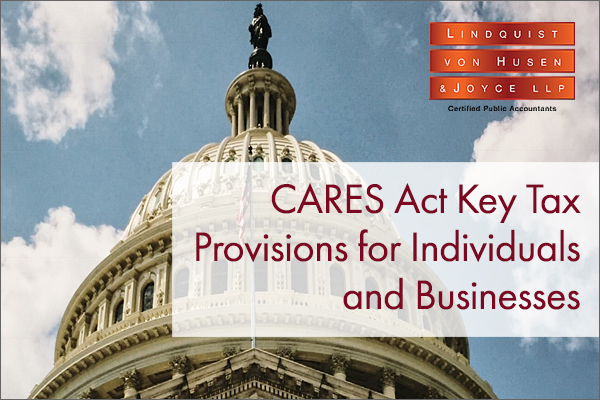
The Coronavirus Aid, Relief, and Economic Security (CARES) Act was signed into law on March 27, 2020. The CARES Act is a $2 trillion relief package aimed at providing relief to the American economy in combating the effects of the coronavirus pandemic.
While the CARES Act is not a tax relief measure, it does include provisions that center on tax relief to individuals and business owners. Following are some of the more noteworthy tax provisions in the Act.
If you have questions, please contact us at info@lvhj.com, and our tax team can assist you for tax planning.
- Economic Impact Payments: Eligible individuals will receive $1,200 ($2,400 for joint filers) plus $500 for each qualifying child. These payments are treated as advanced refundable tax credits, and are not taxable income to the recipient.
- Payroll tax credit refunds: A refundable tax credit against Social Security tax is available to offset employers’ costs of providing paid sick leave and paid family leave.
- Employee retention tax credit: Eligible employers are allowed a credit against employment taxes equal to 50% of qualified wages (up to $10,000 in wages) for each employee. Eligible employers are (1) those whose business is fully or partially suspended by governmental order because of the COVID-19 outbreak, or (2) employers that experience a significant decline in gross receipts.
- Distributions from retirement plans: Early distributions of up to $100,000 in coronavirus-related distributions (CRD) get relief from the Sec. 72(t) 10% early withdrawal penalty. The income recognition from the distribution is to be included in income ratably over three years unless the taxpayer elects not to have the ratable inclusion apply. In addition, any portion of the CRD may be re-contributed in one or more contributions to an eligible retirement plan within three years after the date of distribution. Any amount re-contributed is treated as a rollover and thus is not includible in income. For rollovers, the taxpayer may file amended returns, if needed, to claim a refund of the tax attributable to the amounts previously included in income.
- Loans from retirement plans: Loans of up to $100,000 (up from $50,000) are permitted from a qualified employer plan if you are eligible for CRD.
- Required minimum distributions: The Act suspends required minimum distributions from retirement plans for 2020. This is designed to help individuals whose accounts have been adversely affected by the pandemic — to keep their money in the market until a later date when values normalize.
- Charitable deductions: The Act creates an above-the-line charitable deduction for 2020 (not to exceed $300). The Act also modifies the adjusted gross income (AGI) limitations on charitable contributions for 2020 to 100% of AGI for individuals and 25% of taxable income for corporations.
- Payroll tax: The Act delays payment of 50% of 2020 employer payroll taxes until December 31, 2021; the remaining 50% will be due December 31, 2022. For self-employment taxes, 50% will not be due until those same dates.
- Net Operating Losses (NOLs): The Act repeals the 80% income limitation for NOL deductions for years beginning before 2021. For losses arising in 2018, 2019, and 2020, a five-year carryback is allowed. Taxpayers can also elect to forego the carryback.
- Excess Loss Limitation: Due to Sec. 461(l) as added by the Tax Cuts and Jobs Act (TCJA), losses of non-corporate taxpayers exceeding $250K ($500K for joint filers) were disallowed. The CARES Act repeals the Sec. 461(l) excess loss limitation for taxable years beginning in 2018, 2019, or 2020.
- Corporate Alternative Minimum Tax (AMT): The Act makes the AMT credit for corporations a refundable credit for the 2018 tax year.
- 163(j) Interest Deduction Limitation: For tax years beginning in 2019 and 2020, in computing the business interest expense limitation, taxpayers (other than partnerships) can use 50% of adjusted taxable income (ATI) instead of 30%. For partnerships, it can use 50% of ATI only for tax years beginning in 2020. For all taxpayers subject to Sec. 163(j) limitations, they can elect to use 2019 ATI instead of 2020 ATI for the computation of the limitation for the 2020 tax year. See more about this issue for LIHTC Partnerships in our related blog post.
- Qualified improvement property (QIP): The Act includes the technical corrections regarding QIP under Sec. 168 to make such property 15-year property that would be eligible for bonus depreciation. QIP was previously subject to a 39- year recovery period under the General Depreciation System and 40-year recovery period under Alternative Depreciation System (ADS).
Again, if you have questions, please contact us at info@lvhj.com. You may also like this blog post about changes to filing amended partnership returns.








